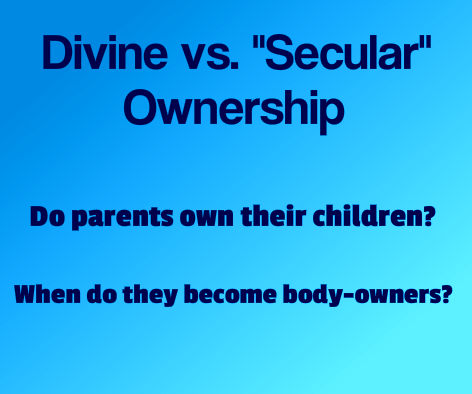
Libertarians have long had trouble with the question of “Who owns a child and when do they become full rights-bearing adults?” Hoppe hinted at the correct answer and Stephan Kinsella fleshed it out.
The article “A Case for Divine Ownership” tries to show a contradiction in libertarian logic by bringing up a similar question to “Who owns a child and when do they become full rights-bearing adults?” He brings up 5 points that libertarians believe in:
1) Parents have authority over infants and children.
2) People have authority over their property.
3) Children are the responsibility of the parent.
4) Self-Ownership is a Right.
5) The social contract is invalid.
I’ll concisely restate what Kinsella has already wrote.
The parents have put their child in a vulnerable situation and now they must take care of the child. This is similar to throwing somebody in a lake and then being obligated to help the person out of the lake. In both cases there are positive rights acquired. Each parent has a positive right to take care of the child, and the thrower has a positive right to help the person in the lake. These positive rights are not antithetical to the private property ethic, i.e., libertarianism, because they were acquired as a result of the parents’ and thrower’s actions.
The child gains full body ownership rights when they can demonstrate that they are rational beings, that they can enter into argumentation. This is because the whole idea of validity only arises with argumentation, and the idea of validity, and thus the question of validity of rights, doesn’t exist for, say, rocks or fish[1]Hans-Hermann Hoppe, The Economics and Ethics of Private Property, page 400.. The question of “what rights are valid, if any,” only exists for rational beings.
The author predicts this rebuttal. He asks, “The problem is, why is it that the parent is the one with such authority, if not for the lack of choice the child possess?”
Stephan Kinsella’s article answers this question, “So, who owns a child’s body? Initially, the parents own it as a sort of temporary trustee. The parents, as the producers of the child, have an objective link to the child’s body that defeats any claims of outsiders (unless the parents sever this link by abusing their position). That is, parents have a better claim to the child than any outsiders, because of their natural link to the child.”
One must have an objective link to a scarce, rivalrous resource that is better than anybody else’s if one is to own the scarce resource. This is implied in Hoppe’s Argumentation Ethics and body-ownership. Rather, the prima facie right to the exclusive control of one’s body cannot be consistently denied in argumentation. The prima facie right of body-ownership must be valid. As such, there cannot be arbitrary claims to one’s body. For example, one cannot simply declare another body as their own; this link must be rooted in action. The objective link between one’s body and one’s self is the direct use of the body.
The author goes on to say, “Children are not the property of parents. Children, like all human beings, are not mere objects that can be possessed.”
He is absolutely incorrect. The parents do own the children, as Kinsella demonstrates in his article. Human beings are objects and they can be possessed. Possession is simply physically having control over the scarce resource. Obviously, at least 1 person possesses any specific human being’s body at any point in time. (There might be two or more if there is a physical conflict going on regarding the body, e.g., when a cop arrests someone.) More importantly, humans can also be owned, i.e., one can have property rights in them. The owners can be the parents, the person itself, or a victim of the person’s aggressive actions.
I need not address any of other parts of his article as I have addressed the “contradiction” in secular libertarian rights. With that being said, divine ownership and “secular” libertarian rights are not incompatible. It can be said ultimately God does own us all, but vis-a-vis other rational beings we own our bodies.
See the Facebook discussion about this post: https://www.facebook.com/TheNickSinard/posts/1257133597631529:0
References
| ↑1 | Hans-Hermann Hoppe, The Economics and Ethics of Private Property, page 400. |
|---|
Be First to Comment